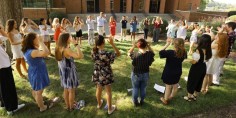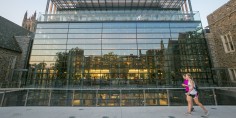Davidson College’s Deliberative Citizenship Initiative aims to encourage constructive engagement around difficult issues through “deliberation” as opposed to “cross talk.” At a time when public discourse is often fractious and unproductive, the college wants to focus on “researching, teaching and enacting deliberative practices that support constructive disagreements” on campus and beyond.
Launched in 2020 with a $256,000 grant from The Duke Endowment, the initiative hosted a guest speaker series, forums and training workshops for students, faculty, staff, alumni and the broader Davidson community. Despite the challenges of COVID restrictions, leaders say inaugural events were a success.
“People told us that these conversations felt different,” says the initiative’s faculty director, Dr. Graham Bullock, an associate professor of Political Science. “They were able to listen to different perspectives and express their own opinions. And instead of ending in acrimony, these conversations gave them a shared sense of hope.”
For its second year, the Deliberative Citizenship Initiative will continue to organize events for campus and community. Participants can join a Deliberative “D” Team, for example, to discuss diverse perspectives with the help of a trained facilitator. Last year’s topics included policing, local legacies of slavery, economic mobility, and gender and sexuality.
“Whenever we live together, whether it’s as global citizens or in a small neighborhood, we’ll have common issues that we’ll need to deal with — and we often don’t see eye to eye on them,” Dr. Bullock says. “Deliberation is one form of discourse that contributes to both shared and new understanding and enables collective decisions and actions.”
1. The Objectives
Five goals frame the Deliberative Citizenship Initiative:
- Teach deliberative skills, including the ability to listen actively and to understand the arguments of others, and to develop, present and defend good arguments of your own
- Reinforce humane instincts such as courage, humility and empathy
- Build community where members participate, feel a sense of belonging and make commitments
- Catalyze creative solutions
- Analyze the deliberative process
As Davidson President Carol Quillen told the student newspaper, “The more people who have practiced this type of collaborative inquiry, the better our conversations will be, the more substantive [they will be], and we’ll make better decisions that way.”
Byron McCrae, a co-convener of the initiative and Davidson’s Vice President for Student Life and Dean of Students, agrees.
“Put together, the terms ‘deliberative’ and ‘citizenship’ suggest both an approach and a mindset,” he says. “It’s our way of helping the community build new skills and a commitment to each other as citizens.”
2. The Work
The initiative has four components for its work:
- Deliberation across the curriculum
- Deliberation on campus
- Deliberation in the community
- Research on deliberation
3. Programs
Deliberative Citizenship Initiative Fellows spend the academic year in a leadership role. The first year’s 13 Fellows included students, faculty and staff who analyzed and explored deliberation, deliberative ideas and programs. They also facilitated the D Teams and launched their own small-scale deliberative projects. Eight hours of training helped them build skills.
D Teams are small groups with diverse viewpoints who meet monthly to get to know each other and share their perspectives. Participants receive a deliberation guide and background information. “Beyond the Deliberation” provides follow-up resources, readings and action steps for ways to become more informed and involved.
The initiative is supporting research on deliberation, and it’s tracking its own outcomes. Last year, for instance, a student researcher coded anonymized transcripts from D Teams to study the quality of discourse, how facilitators are intervening, and making recommendations for improvement.
Resources developed through the initiative include guides on “How to Disagree” and the “DCI Guide to One-on-One Conversations.”
4. Events
Initiative leaders hosted several events, including panel conversations, a speaker series, training workshops and four deliberative forums to introduce participants to the basic skills of deliberation.
The “Reforming the Supreme Court” forum featured scholars from Yale, the University of Chicago and Boston College School of Law. For “Our Housing Future” (which attracted more than a 100 people and had a waitlist), panelists included representatives from the Town of Davidson, UNC Charlotte, and a Charlotte organization that’s focused on ending homelessness.
The speaker series showcased approaches to deliberation. The session on “Rhetoric, Deliberation, and Democratic Life,” for example, featured Debra Hawhee, the McCourtney Professor of Civic Deliberation at Penn State University.







